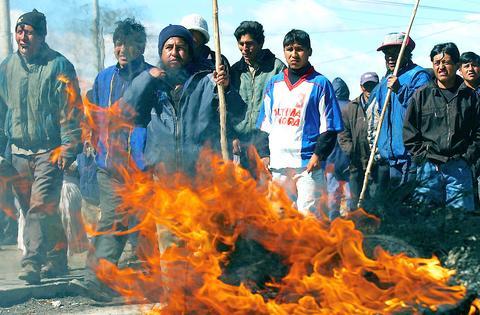Bolivians faced the unwieldy task yesterday of turning their historic referendum over the Andean nation's natural gas reserves into real policies to tighten state control over the industry.
The referendum, seen also as a vote of confidence in President Carlos Mesa, essentially asked Bolivians if they wanted to increase state participation in the impoverished nation's energy industry and export the gas abroad.
Mesa, who was installed nine months ago after his predecessor was kicked out by an Indian revolt, declared victory in the referendum late on Sunday, saying the country had backed each of his proposals.

PHOTO: AP
Early results appeared to support his claim, with the National Electoral Court's Web site showing a majority of Bolivians in support of his proposals with nearly 8.5 percent of the voting stations counted.
Unofficial counts by state and private television also showed Mesa had come out ahead in what analysts say is a vote that will lend his government legitimacy in a country increasingly divided between the rich elite and the millions of poor Indians who make up the majority of its 8 million people.
But political analysts say the referendum's questions have been phrased so ambiguously that interpreting them and enacting legislation presents another challenge for the 50-year-old leader.
Mesa has no formal political support in a Congress known for its internal squabbling.
"This is undoubtedly a victory for Mesa. But the government has only overcome its first obstacle. Now these referendum proposals must go to Congress and that will be another battle. The difficulties may have just begun," said Jorge Lazarte, a political analyst.
Fury at a US$5 billion plan to export gas via Chile, Bolivia's historical enemy, lay behind a siege of the capital by Indian groups in October in which dozens of protesters were killed. The violence led to the ouster of pro-Washington president Gonzalo Sanchez de Lozada.
Mesa, his replacement, called the referendum to appease Indians, who made nationalization a rallying cry of October's revolt. He turned the election into a vote of confidence.
Defeat in the referendum would have forced him from office and plunged Bolivia, with a history of coups, into civil unrest.
The referendum was seen as the best of the worst by foreign investors, given that a "no" vote would have plunged Bolivia into chaos. Foreign companies will have to deal with stronger state controls and higher taxes.
Oil companies with operations in Bolivia include Brazil's Petrobras, Spain's Repsol, France's Total and Britain's BG and BP.
The vote may come as a relief to Washington, which feared that more unrest in Bolivia, the world's third-largest source of coca leaf used to make cocaine, could lead to more drug smuggling from an Andean region where there is growing indigenous anger at "gringo imperialism."
The vote could also send a political signal across Latin America, where democratic leaders from Argentina to Peru face voter backlash after a decade of market reforms that many argue have benefited foreign firms and the rich.

PRECARIOUS RELATIONS: Commentators in Saudi Arabia accuse the UAE of growing too bold, backing forces at odds with Saudi interests in various conflicts A Saudi Arabian media campaign targeting the United Arab Emirates (UAE) has deepened the Gulf’s worst row in years, stoking fears of a damaging fall-out in the financial heart of the Middle East. Fiery accusations of rights abuses and betrayal have circulated for weeks in state-run and social media after a brief conflict in Yemen, where Saudi airstrikes quelled an offensive by UAE-backed separatists. The United Arab Emirates is “investing in chaos and supporting secessionists” from Libya to Yemen and the Horn of Africa, Saudi Arabia’s al-Ekhbariya TV charged in a report this week. Such invective has been unheard of

‘TERRORIST ATTACK’: The convoy of Brigadier General Hamdi Shukri resulted in the ‘martyrdom of five of our armed forces,’ the Presidential Leadership Council said A blast targeting the convoy of a Saudi Arabian-backed armed group killed five in Yemen’s southern city of Aden and injured the commander of the government-allied unit, officials said on Wednesday. “The treacherous terrorist attack targeting the convoy of Brigadier General Hamdi Shukri, commander of the Second Giants Brigade, resulted in the martyrdom of five of our armed forces heroes and the injury of three others,” Yemen’s Saudi Arabia-backed Presidential Leadership Council said in a statement published by Yemeni news agency Saba. A security source told reporters that a car bomb on the side of the road in the Ja’awla area in

US President Donald Trump on Saturday warned Canada that if it concludes a trade deal with China, he would impose a 100 percent tariff on all goods coming over the border. Relations between the US and its northern neighbor have been rocky since Trump returned to the White House a year ago, with spats over trade and Canadian Prime Minister Mark Carney decrying a “rupture” in the US-led global order. During a visit to Beijing earlier this month, Carney hailed a “new strategic partnership” with China that resulted in a “preliminary, but landmark trade agreement” to reduce tariffs — but

SCAM CLAMPDOWN: About 130 South Korean scam suspects have been sent home since October last year, and 60 more are still waiting for repatriation Dozens of South Koreans allegedly involved in online scams in Cambodia were yesterday returned to South Korea to face investigations in what was the largest group repatriation of Korean criminal suspects from abroad. The 73 South Korean suspects allegedly scammed fellow Koreans out of 48.6 billion won (US$33 million), South Korea said. Upon arrival in South Korea’s Incheon International Airport aboard a chartered plane, the suspects — 65 men and eight women — were sent to police stations. Local TV footage showed the suspects, in handcuffs and wearing masks, being escorted by police officers and boarding buses. They were among about 260 South